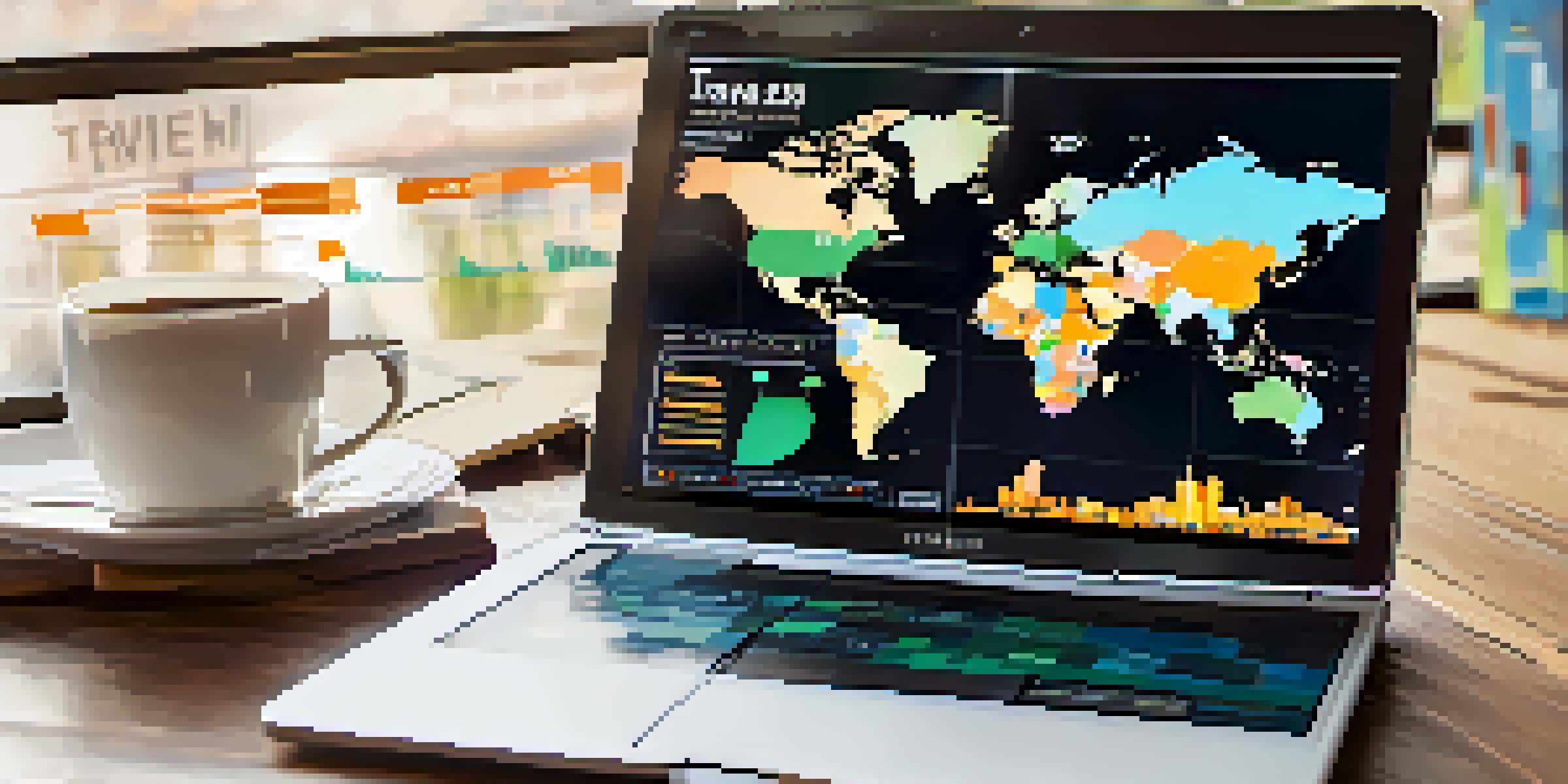The Ultimate Guide to Budgeting for Travel in 2023

Understanding the Basics of Travel Budgeting
Travel budgeting is the art of allocating your funds wisely to ensure you enjoy your trip without financial stress. It involves planning how much you will spend on transportation, accommodation, food, and activities. By grasping the basics, you can create a roadmap that will guide you to a fun and fulfilling travel experience.
Budgeting isn't about limiting yourself - it's about making the things that excite you possible.
To start, assess your total travel budget, which should include savings and any expected income during your trip. Consider factors like destination, travel style, and duration, as these will influence your overall expenses. Understanding these elements helps you set realistic expectations for your travel experience.
Next, break down your budget into categories to identify where your money will go. This could mean allocating a specific amount for lodging, meals, and sightseeing, ensuring you have enough for each aspect of your journey. With a clear picture of your finances, you can make informed decisions that align with your travel goals.
Setting Realistic Travel Goals and Expectations
Before embarking on your adventure, it's crucial to set realistic travel goals. Think about what you want to achieve: relaxation, exploration, or perhaps cultural immersion? Establishing these goals will help you allocate your budget effectively and prioritize your spending.

Consider the time of year and destination when setting your expectations. For instance, traveling during peak season may require a larger budget due to higher prices for flights and accommodations. On the other hand, off-peak travel often presents opportunities for savings, allowing you to stretch your budget further.
Plan Your Travel Budget Wisely
Allocating funds for transportation, accommodation, food, and activities ensures a stress-free travel experience.
Additionally, factor in personal preferences and lifestyle choices. If you're someone who enjoys dining out at nice restaurants, your food budget will differ significantly from a traveler who prefers street food. Aligning your budget with your expectations ensures a satisfying travel experience without overspending.
Identifying Key Travel Expenses to Consider
When budgeting for travel, it's essential to identify all potential expenses. Start with major costs like flights, accommodations, and transportation, as these are typically the largest portions of your budget. Understanding these key expenses helps you gauge the overall cost of your trip.
Traveling – it leaves you speechless, then turns you into a storyteller.
Don't forget about daily costs such as meals, activities, and attractions. These can add up quickly, especially in tourist-heavy areas. Create a daily budget for these expenses to keep your finances in check while still enjoying what your destination has to offer.
Lastly, remember to include unexpected costs in your budget, such as travel insurance, souvenirs, or emergency expenses. Having a buffer ensures that you're prepared for any surprises, allowing you to travel with peace of mind.
Tips for Saving Money on Travel Accommodations
Finding affordable accommodations can significantly impact your travel budget. Consider options like hostels, vacation rentals, or budget hotels that offer competitive rates. Websites and apps that compare prices can help you find the best deals for your stay.
Another great way to save is to book your accommodations in advance. Last-minute bookings often come with inflated prices, especially during peak seasons. By planning ahead, you can secure better rates and ensure availability in your desired location.
Identify Key Travel Expenses
Recognizing major and daily costs helps you gauge the overall budget and prepare for unexpected expenses.
Lastly, consider alternative lodging options, like staying with friends or family or utilizing platforms that connect travelers with locals. These choices can provide unique experiences while keeping your costs low, allowing you to allocate more of your budget to activities and experiences.
Finding Affordable Transportation Options While Traveling
Transportation can take a big chunk of your travel budget, so finding affordable options is key. Start by researching flights and comparing prices across different airlines or using flight comparison sites. Flexibility with your travel dates can also lead to significant savings.
Once you arrive at your destination, consider using public transportation instead of taxis or rideshares. Buses and trains are often more economical, and they give you a chance to experience local culture. Many cities also offer travel passes that provide unlimited rides for a set period, which can be a great deal.
If you're feeling adventurous, renting a bicycle or walking can be a fun and cost-effective way to explore. Not only will you save money, but you'll also get to see hidden gems that you might miss while driving or taking public transport.
Budget-Friendly Dining: Eating Well Without Breaking the Bank
Eating well on a budget is possible with a little planning. Start by researching local eateries and street food options that are popular among locals—these often provide delicious meals at a fraction of the cost of touristy restaurants. Embrace the local cuisine without overspending by seeking out authentic dining experiences.
Consider cooking some of your meals if you’re staying in a place with kitchen facilities. Visiting local markets can be a fun way to immerse yourself in the culture while saving money on food. Preparing your meals not only cuts costs but also allows you to try new ingredients and flavors.
Stay Flexible with Your Budget
Being open to adjusting your budget allows you to enjoy spontaneous experiences without financial strain.
Finally, don't hesitate to ask locals for dining recommendations. They often know hidden gems where you can enjoy excellent food without the tourist markup. Engaging with locals can enhance your travel experience and lead to memorable meals.
Creating a Travel Budget Spreadsheet for Easy Tracking
A travel budget spreadsheet is an invaluable tool for managing your expenses. Start by listing all your anticipated costs in separate categories, such as transportation, accommodations, meals, and activities. This organization provides a clear view of your budget at a glance.
As you spend during your trip, update your spreadsheet regularly to keep track of your expenses. This will help you stay accountable and adjust your spending if necessary. If you find that you're overspending in one category, you can cut back in another to balance your budget.

Using a digital spreadsheet also allows for easy calculations and adjustments. You can quickly see how much you have left in your budget and make informed decisions about future spending. This proactive approach to budgeting can help you enjoy your travels without financial worries.
Staying Flexible: Adjusting Your Budget as Needed
Flexibility is crucial when it comes to travel budgeting. Unexpected expenses may arise, or you might discover activities that spark your interest but weren't initially in your plans. Being open to adjusting your budget can enhance your travel experience.
If you find yourself spending more in one area than anticipated, consider cutting back in another. For example, if you splurge on a fancy dinner, you might want to opt for cheaper accommodations or skip an expensive attraction to balance things out.
Ultimately, the goal is to enjoy your travels while staying within your means. Embrace the unexpected and allow your budget to adapt as needed. This mindset not only relieves financial stress but also enriches your overall travel experience.